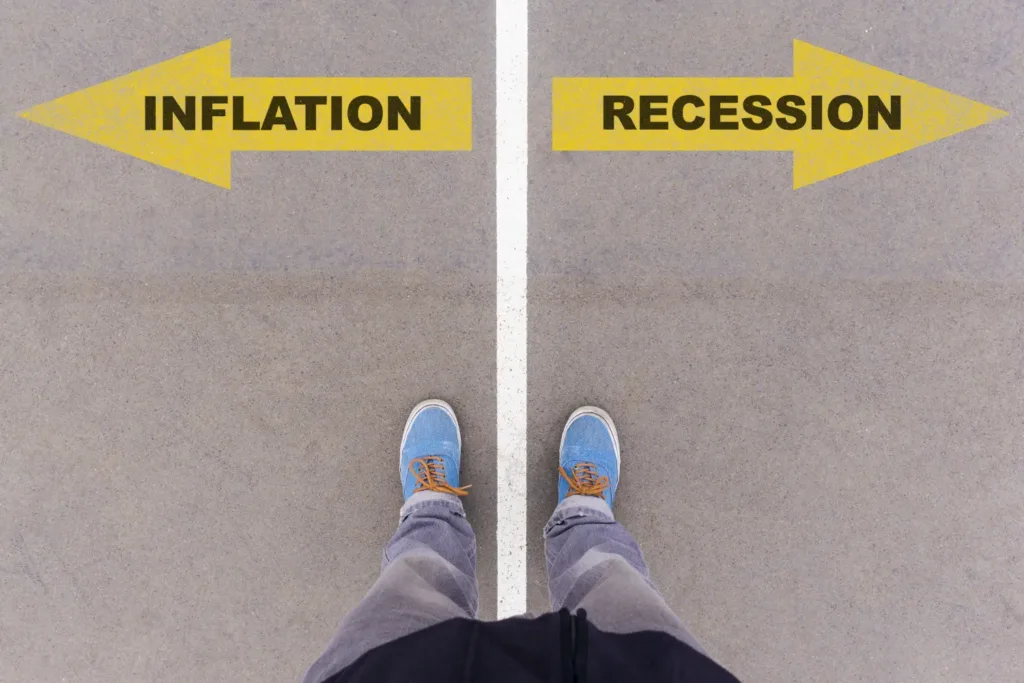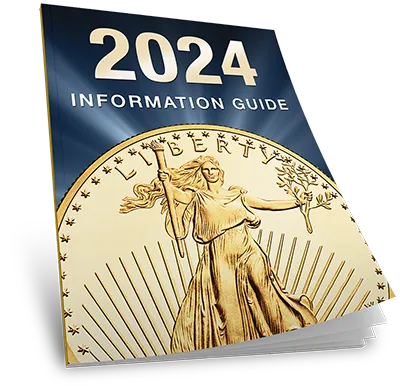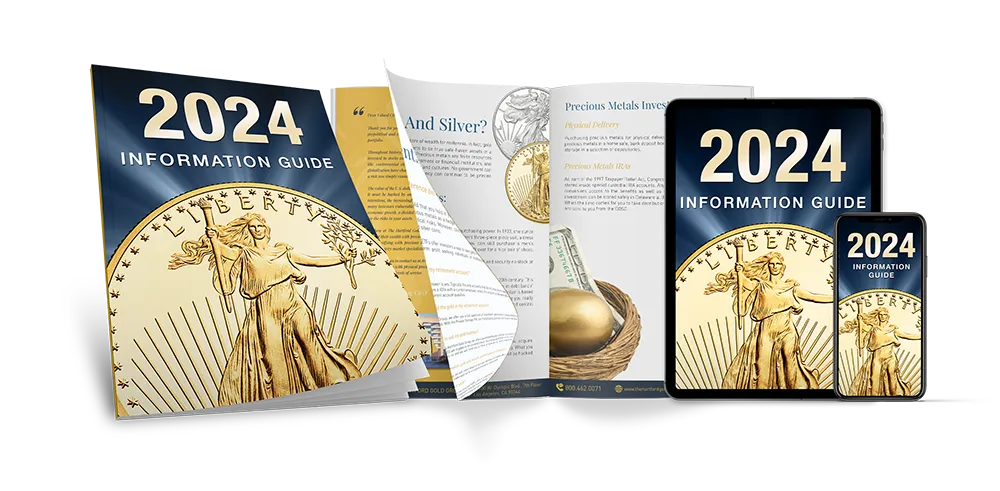Inflation and economic recessions hit close to home for many of us. At a time when traditional banking solutions are becoming less appealing, understanding these concepts is more important than ever.
“Inflation” and “recession” are key terms we’ve often heard in economic news, but their implications go far beyond headlines. They impact our daily lives, from the prices we pay at the store to the stability of our jobs.
Let’s explore the key similarities and differences between inflation and a recession.
What Is Inflation?
Inflation is the rate at which the general level of prices for goods and services is rising and, subsequently, how it erodes the purchasing power of a currency. It’s a natural part of a growing economy, but its effects are felt in various ways.
What Causes Inflation?
Several factors can trigger inflation. It could stem from increased production costs like higher prices for raw materials or wages. Alternatively, it can result from increased consumer demand outweighing supply. Governments and central banks also play a role, as their policies can influence inflation rates.
Does Moderate Inflation Have a Silver Lining?
A little inflation can be beneficial for the economy. Moderate inflation means the economy is healthy and growing as it should, and it also encourages people to spend money and invest as they anticipate higher prices.
This spending fuels businesses, which can then hire more employees and pay higher wages, creating a positive economic cycle. But this only goes so far — there comes a point when inflation is a real problem and no longer benefits the economy.
On the Contrary: High Inflation’s Impact
When inflation rates surge beyond a certain point — typically the Federal Reserve’s target of around 2% annually — it becomes a concern. High inflation can erode your purchasing power, making everyday items more expensive.
This can strain personal budgets, leaving less room for savings or discretionary spending. Higher costs can reduce profit margins for businesses, leading to layoffs or reduced investment. In extreme cases, runaway inflation can lead to economic turmoil.
Understanding inflation’s role is important as individuals seek stability in uncertain economic times. It solidifies the growing interest in alternatives like gold, which historically has been a go-to asset in times of high inflation.
What Is a Recession?
A recession is a significant decline in economic activity lasting over a few months.
Typically, it’s visible in real GDP, income, employment, industrial production, and wholesale retail sales. A recession is like an economic winter, where growth slows, businesses contract, and overall economic activity diminishes.
What Are the Root Causes of Recessions?
Various factors can trigger recessions. Some common causes include:
Economic Shocks: Unexpected events like oil price hikes or global pandemics can disrupt economic stability.
Financial Imbalances: This includes scenarios like the housing market collapse in 2008, where excesses in one part of the economy lead to broader instability.
High Interest Rates: Central banks sometimes raise interest rates to control inflation, which can slow economic growth and lead to a recession.
Reduced Consumer Spending: When people start to spend less, perhaps due to decreased confidence in the economy, businesses suffer and a slowdown may occur.
During a recession, you can expect an uptick in unemployment as companies lay off workers to cut costs. This leads to reduced consumer spending, further exacerbating the economic slowdown. For the average person, this could mean job insecurity, decreased income, and a potential devaluation of investments.
For businesses, especially smaller ones, recessions can be particularly challenging. They may struggle with reduced sales, difficulties securing loans, and need to streamline operations or fully shut down.
The Role of the NBER
Determining whether an economy has entered a recession is the job of the NBER (National Bureau of Economic Research), a private, nonpartisan organization.
They don’t just declare a recession based on a hunch or a bad quarter — they analyze a range of economic indicators over several months. Their declaration is a crucial signal to policymakers, businesses, and individuals about the state of the economy.
How Are Inflation and Recession Different?
Considering inflation and recession is like comparing two different beasts in the economic jungle. Both have significant impacts, but their natures and effects are quite distinct.
With that in mind, let’s examine their key differences:
Nature of Economic Activity: Inflation signifies a price rise, often linked with robust economic activity. In contrast, a recession is marked by decreased economic activity, with declining GDP and employment rates.
Impact on Purchasing Power: Inflation erodes the value of money, making goods and services more expensive. During a recession, though, the primary concern is the availability of economic opportunities, like jobs and investments.
Policy Responses: Central banks often respond to high inflation by raising interest rates to cool the economy. They’re more likely to lower rates to stimulate growth in a recession.
There are also various effects they have on different sectors. Here’s what you can expect in either scenario:
Consumer Behavior: High inflation can lead to cautious spending as people grapple with increased costs. In a recession, consumer spending often drops due to income uncertainty or job loss.
Business Operations: Inflation can increase the cost of raw materials, affecting profit margins. During recessions, businesses face declining sales and the need to downsize.
Investment Landscape: Investors might seek inflation hedges during high inflation periods, while in recessions, the focus often shifts to preserving capital.
How Are Inflation and Recession Related?
Understanding the interplay between inflation and recession is key to grasping the economic rhythm. They can influence each other in significant ways.
When inflation leads to a recession, the following factors play a role:
Overheating Economy: Sometimes, if an economy grows too quickly, it can lead to inflation. In response, central banks might increase interest rates to prevent the economy from overheating. However, these higher rates can also slow economic activity, potentially triggering a recession.
Reduced Spending Power: Persistently high inflation can erode consumers’ purchasing power. This might result in reduced consumer spending, slowing economic growth, and possibly leading to a recession.
Recession can also impact inflation in a few key ways:
Decreased Demand: As consumer and business spending declines during a recession, demand for goods and services falls. This decreased demand can lead to lower inflation rates or even deflation (a decrease in the general price level of goods and services).
Supply Chain Adjustments: In a recession, supply chains might adjust to the lower demand, affecting prices and potentially influencing inflation rates.
You have the right to be concerned in either scenario. Thankfully, gold stands out for its stability in a changing market. Its historical resilience in various economic climates makes it an appealing option for those looking to diversify their assets, especially in a Gold IRA.
Gold’s enduring value can provide security against the unpredictable moves of inflation and recession, making it a noteworthy consideration for anyone looking for more economic confidence.
How To Manage Economic Uncertainty With Gold
In the ever-shifting sands of the economy, gold shines as a beacon of stability. This is where the concept of a Gold IRA, championed by American Hartford Gold, becomes particularly pertinent.
Gold IRA: A Safe Haven
A Gold IRA is a self-directed individual retirement account that provides assets in physical gold, among other precious metals, rather than the stocks and bonds typically found in traditional IRAs.
This unique IRA has its own rules and regulations, offering a distinct approach to retirement savings. American Hartford Gold stands out, assisting clients in setting up a Gold IRA and providing a reliable route to include physical gold in their retirement planning.
Why Gold?
In times of economic uncertainty, gold is often considered a safe haven. Gold has historically maintained its value over the long term, unlike many other assets. During periods of high inflation or recession, when traditional investments might falter, gold often holds its ground or even increases in value.
Take Action Today with American Hartford Gold
If the idea of including gold in your financial strategy resonates with you, American Hartford Gold will guide you through the process.
Whether you’re looking to set up a new Gold IRA or add gold to your existing portfolio, we offer the expertise and resources to help you secure your financial future against the unpredictable waves of the economy.
Reach out to us today and take a step toward securing a more stable and diversified financial future.
Sources:
Study offers new perspective on the 2008 housing crash | UGA
Chart Book: Tracking the Post-Great Recession Economy | Center on Budget and Policy Priorities
Supply Chain Leaders, It’s Time to Rethink Your Recession Playbook | Gartner






